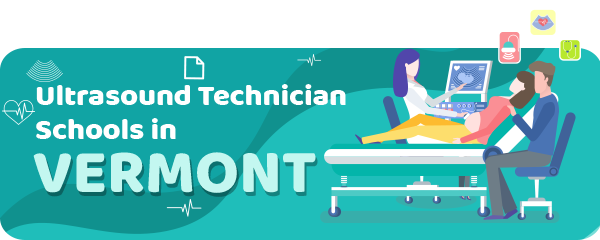Vermont’s main industries are retail sales and maple syrup production.
The health sector, however, is expected to grow slowly.
Becoming an ultrasound technician in Vermont is very easy, as training can last for as little as 1 year.
There are a few things to know about this career option in one of the smallest and least populated states in the country.
Salary Expectations
Ultrasound technicians are pretty important in many medical fields.
This allows them to earn a higher salary than other professionals.
In Vermont, the average pay for an ultrasound technician is $73,675 per year, but this depends on a person’s skills and specialization.
Annual Salary Range:| Location | Avg. Annual Salary |
|---|---|
| Burlington | $75,335 |
| Essex | $75,335 |
| South Burlington | $75,335 |
| Colchester | $75,335 |
| Rutland | $76,012 |
| Bennington | $77,398 |
| Brattleboro | $77,554 |
| Milton | $75,289 |
| Essex Junction | $75,335 |
| Williston | $75,335 |
Certification Requirements
Those who want to become an ultrasound or sonograph technician are not required to earn a certification.
Employers, however, will prefer candidates who possess some sort of credentials as they already received the training needed to operate the equipment and properly record the results.
The American Registry for Diagnostic Medical Sonography, or ARDMS, issues certifications that are recognized all throughout the country.
Interested individuals need to first enroll in a training program with CAAHEP (Commission on Accreditation of Allied Health Education Programs) accreditation, and then sit through and pass an exam.
The training needs to meet these minimum requirements:
- 60 semester hours
- Clinical training, for hands-on training with the ultrasound equipment
Candidates that wan to enroll in a training program might have to prove a good knowledge of the following topics:
- Anatomy & Physiology,
- Medical Terminology
- English
- Speech
Students can choose one specialization, out of the several available.
These are:
- MRI, where cutting edge technology is used to reproduce 3D images
- EKG, to record heart-related data
- Ultrasound, with many purposes
- Sonography, used on most body parts
- Radiology, which can be quite a dangerous field
- Vascular sonography, where precision is the main skill of the technician
Each specialization will have specific classes students will need to attend, but also subjects common to all ultrasound fields.
These are some of the classes to be expected:
- Pathophysiology,
- Abdominal ultrasound,
- Ultrasound physics,
- Vascular ultrasound
During hands-on practice, future technicians will learn about:
- Value calculation,
- Image analyzing,
- Image capturing
Students have the possibility of earning an Associates’s degree in 2 years or a Bachelors’s degree in 4 years.
| School Name | Address |
|---|---|
| Vermont Technical College | PO Box 500 124 Admin Drive Randolph Center, VT 05061 |
There are several other ways to be accepted for the exam, but the training program is the most popular method.
The topics of the exam cover:
- Recordkeeping,
- Protection techniques,
- Communication skills
Extra Information
The certification is valid for 2 years only.
To renew it, technicians need to complete 24 continuing education credits.
It is possible that some schools won’t offer training for the desired specialization in Vermont, given its small size.
Candidates have the possibility of checking out the educational institutions in the neighboring states.
Read the full guide: How to Become an Ultrasound Technician
